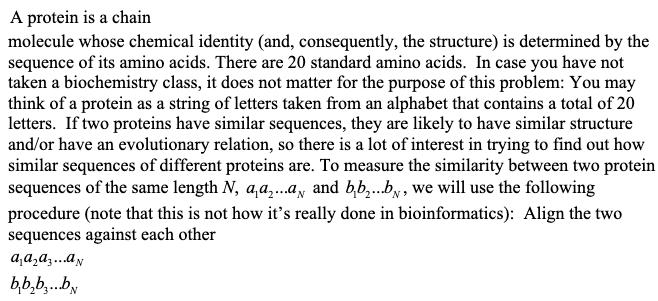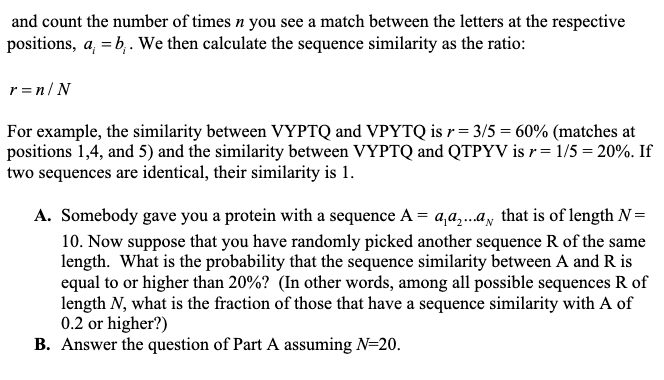Answered step by step
Verified Expert Solution
Question
1 Approved Answer
A protein is a chain molecule whose chemical identity (and, consequently, the structure) is determined by the sequence of its amino acids. There are


A protein is a chain molecule whose chemical identity (and, consequently, the structure) is determined by the sequence of its amino acids. There are 20 standard amino acids. In case you have not taken a biochemistry class, it does not matter for the purpose of this problem: You may think of a protein as a string of letters taken from an alphabet that contains a total of 20 letters. If two proteins have similar sequences, they are likely to have similar structure and/or have an evolutionary relation, so there is a lot of interest in trying to find out how similar sequences of different proteins are. To measure the similarity between two protein sequences of the same length N, aa,...a and b,b,...b, we will use the following procedure (note that this is not how it's really done in bioinformatics): Align the two sequences against each other aaa...aN bbb...b and count the number of times n you see a match between the letters at the respective positions, a, b,. We then calculate the sequence similarity as the ratio: r=n/N For example, the similarity between VYPTQ and VPYTQ is r = 3/5 = 60% (matches at positions 1,4, and 5) and the similarity between VYPTQ and QTPYV is r = 1/5 = 20%. If two sequences are identical, their similarity is 1. A. Somebody gave you a protein with a sequence A = a,a,...a that is of length N = N 10. Now suppose that you have randomly picked another sequence R of the same length. What is the probability that the sequence similarity between A and R is equal to or higher than 20%? (In other words, among all possible sequences R of length N, what is the fraction of those that have a sequence similarity with A of 0.2 or higher?) B. Answer the question of Part A assuming N=20.
Step by Step Solution
There are 3 Steps involved in it
Step: 1

Get Instant Access to Expert-Tailored Solutions
See step-by-step solutions with expert insights and AI powered tools for academic success
Step: 2

Step: 3

Ace Your Homework with AI
Get the answers you need in no time with our AI-driven, step-by-step assistance
Get Started


